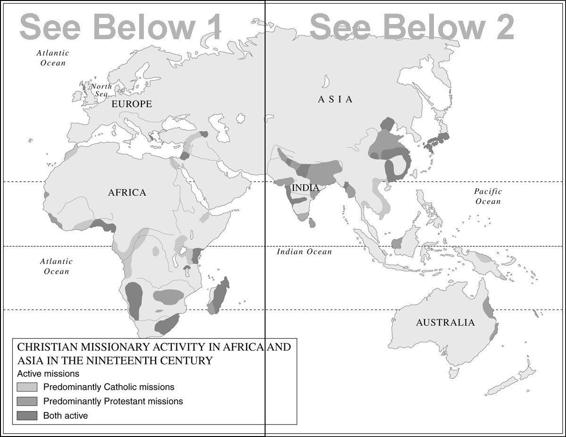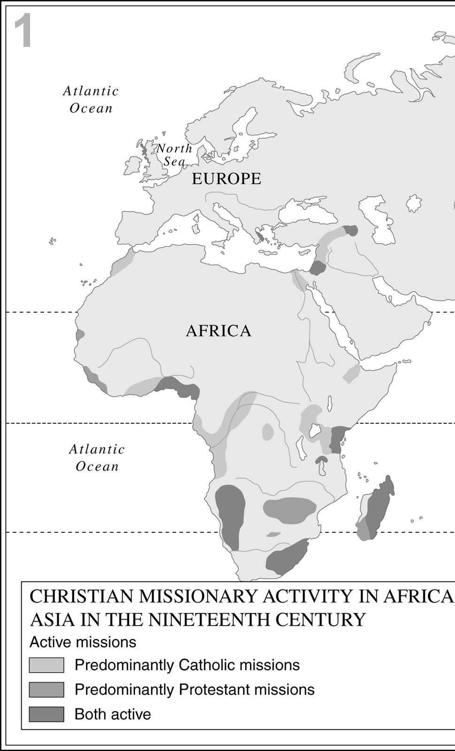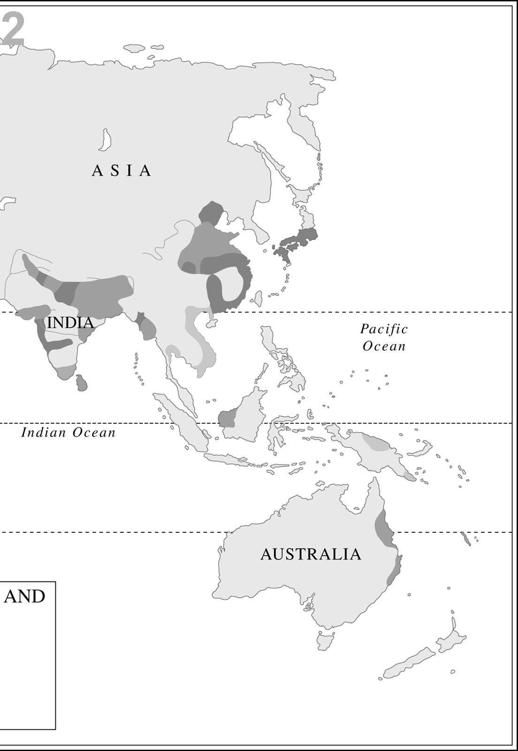The New Penguin History of the World (124 page)
Read The New Penguin History of the World Online
Authors: J. M. Roberts,Odd Arne Westad
5
World History’s New Shape
In 1776 there began in America the first of a series of colonial revolts, which were to take several decades to work themselves out. Besides marking an epoch in the history of the American continents, these upheavals also provide a convenient vantage-ground from which to consider the first phase of European hegemony as a whole. In other parts of the world, too, something of a change of rhythm was marked by such facts as the elimination of serious French competition to the British in India, and the opening of Australasia, the last discovered and habitable continent, to settlement. At the end of the eighteenth century there is a sense of completing one era and opening another; it is a good point for assessment of the difference made by the previous three centuries to the history of the globe.
During them, outright conquest and occupation were the main form of European hegemony. They provided wealth Europe could use to increase still further its relative superiority over other civilizations and they set up political structures which diffused other forms of European influence. They were the work of a handful of European states, which were the first world powers in the geographical range of their interests, even if not in their strength: the Atlantic nations to which the age of discoveries had given opportunities and historical destinies distinct from those of other European states.
The first to seize these opportunities had been Spain and Portugal, the only great colonial powers of the sixteenth century. They had long passed their zenith by 1763, when the Peace of Paris, which ended the Seven Years’ War, was signed. This treaty is a convenient marker of a new world order which had already replaced that dominated by Spain and Portugal. It registered the ascendancy of Great Britain in the rivalry with France overseas, which had preoccupied her for nearly three-quarters of a century. The duel was not over, and Frenchmen could still be hopeful that they would recover lost ground. Great Britain, none the less, was the great imperial power of the future. These two nations had eclipsed the Dutch, whose empire had been built, like theirs, in the seventeenth century, in the
era of declining Portuguese and Spanish power. But Spain, Portugal and the United Provinces all still held important colonial territories and had left enduring marks on the world map.
These five nations had by the eighteenth century been differentiated by their oceanic history both from the landlocked states of central Europe and from those of the Mediterranean so important in earlier centuries. Their special colonial and overseas trade interests had given their diplomats new causes and places over which to compete. Most other states had been slower to recognize how important issues outside Europe might be, and so, indeed, had even some of these five at times. Spain had fought grimly enough (first for the Habsburgs in Italy, then against the Ottomans, and finally for European supremacy in the Thirty Years’ War) to waste the treasure of the Indies in the process. In their long duel with the British, the French were always more liable than their rivals to distraction and the diversion of their resources to continental ends. At the outset, the discernment that extra-European issues might be intrinsically tangled with European interests in diplomacy had, after all, barely existed. Once the Spanish and Portuguese had demarcated their interests to their own satisfaction there was little to concern other European nations. The fate of a French Huguenot settlement in Florida or the flouting of the vague Spanish claims which was implicit in the Roanoke voyages hardly troubled the minds of European diplomats, let alone shaped their negotiations. This situation began to change when English pirates and adventurers countenanced by Elizabeth I began to inflict real damage on the Spanish fleets and colonies. They were soon joined by the Dutch and from this time one of the great themes of the diplomacy of the next century was apparent; as a French minister wrote under Louis XIV, ‘Trade is the cause of a perpetual combat in war and in peace between the nations of Europe’. So much had things changed in two hundred years.
Rulers had, of course, always been concerned with wealth and the opportunity of increasing it. Venice had long defended her commerce by diplomatic means and the English had often safeguarded their cloth exports to Flanders by treaty. It was widely accepted that there was only so much profit to go around and that one country could therefore only gain at the expense of others. But it was a long time before diplomacy had to take account of the pursuit of wealth outside Europe. There was even an attempt to segregate such matters; in 1559 the French and Spanish agreed that what their captains did to one another ‘beyond the line’ (which meant at that time west of the Azores, and south of the Tropic of Cancer) should not be taken as a reason for hostility between the two states in Europe.
The change to a new set of diplomatic assumptions, if that is the way to
put it, began in conflicts over trade with the Spanish empire. Contemporary thinking took it for granted that in the colonial relationship the interests of the metropolitan power were always paramount. In so far as those interests were economic, settlement colonies were intended to produce, either by exploiting their mineral and natural resources or by their balance of trade with the mother country, a net advantage to the latter and, if possible, self-sufficiency, while her trading bases gave her the domination of certain areas of international traffic. By 1600 it was clear that claims would be settled by sea-power, and since the defeat of the Armada Spanish sea-power no longer commanded the respect it had done. Essentially, Philip was caught in a dilemma: the dispersal of his effort and interest between Europe – where the struggle with the Valois and Elizabeth, the Dutch Revolt, and the Counter-Reformation all claimed his resources – and the Indies, where safety could have lain only in sea-power and the organization of effective Spanish supply of the colonists’ needs. The choice was to try to keep the empire, but to use it to pay for European policies. This was to underrate the difficulties of controlling so huge an empire through sixteenth-century bureaucracy and communications. Nevertheless a huge and complicated system of regular sailings in convoy, the concentration of colonial trade in a few authorized ports and policing by coastguard squadrons were ways in which the Spanish tried to keep the wealth of the Indies to themselves.
It was the Dutch who first made it clear that they were prepared to fight for a share of such prizes and therefore first forced diplomats to turn their attention and skills to regulating matters outside Europe. For the Dutch, predominance in trade overrode other considerations. What they would do for it was made clear from the start of the seventeenth century, in the East Indies, the Caribbean and Brazil, where they engaged great fleets against the Spanish-Portuguese defence of the world’s chief producer of sugar. The last provided their only serious failure, for in 1654 the Portuguese were able to evict the Dutch garrisons and resume control without subsequent challenge.
This quest for commercial wealth cut across the wishes of the most Protestant of English seventeenth-century governments; England had been an ally of the Dutch rebels in the previous century and Cromwell would have liked nothing better than the leadership of a Protestant alliance against Catholic Spain. Instead he found himself fighting the first of three Anglo-Dutch wars. The first (1652–4) was essentially a trade war. What was at issue was the English decision to restrict imports to England to goods travelling in English ships or those of the country producing the goods. This was a deliberate attempt to encourage English shipping and put it in a position to catch up with the Dutch. It struck at the heart of Dutch prosperity: its European carrying trade and, in particular, that in Baltic goods. The Commonwealth had a good navy and won. The second round came in 1665, after the Dutch had been further provoked by the English seizure of New Amsterdam. In this war the Dutch had the French and Danes as allies and also had the best of it at sea. At the peace they were therefore able to win an easing of the English restrictions on imports, although they left New Amsterdam to the English in exchange for an offshoot of Barbados at Surinam. This was decided by the Treaty of Breda (1667), the first multilateral European peace settlement to say as much about the regulation of extra-European affairs as European. By it France surrendered West Indian islands to England and received in return recognition of her possession of the uninhabited and uninviting but strategically important territory of Acadia. The English had done well; the new Caribbean acquisitions followed in a tradition established under the Commonwealth, when Jamaica had been taken from Spain. It was England’s first transoceanic acquisition of territory by conquest.



Cromwell’s policies have been seen as a decisive turn towards conscious imperial policy. This may be attributing too much to his vision. The returned Stuarts indeed kept intact most of the ‘Navigation’ system for the protection of shipping and colonial trade, as well as hanging on to Jamaica
and continuing to recognize the new importance of the West Indies. Charles II gave a charter to a new company, named after Hudson Bay, to contest with the French the fur trade of the north and west. He and his in other ways inadequate successor, James II, at least maintained (even if with some setbacks) English naval strength so that it was available to William of Orange in his wars with Louis XIV.
It would be tedious to trace the detailed changes of the next century, during which the new imperial emphasis, first of English and then of British diplomacy, came to maturity. A brief third Anglo-Dutch war (it had virtually no important consequences) does not really belong to this epoch, which is dominated by the long rivalry of England and France. The War of the League of Augsburg (or King William’s War, as it was called in America) brought much colonial fighting, but no great changes. The War of the Spanish Succession was very different. It was a world war, the first of the modern era, about the fate of the Spanish empire as well as about French power. At its close, the British not only won Acadia (henceforth Nova Scotia) and other acquisitions in the western hemisphere from the French, but also the right to supply slaves to the Spanish colonies and to send one ship a year with merchandise to trade with them.
Overseas matters loomed larger and larger in British foreign policy after this. European considerations mattered less, in spite of the change of dynasty in 1714, when the Elector of Hanover became the first king of Great Britain. Though there were some embarrassing moments, British policy remained remarkably consistent, always swinging back to the goals of promoting, sustaining and extending British commerce. Often this was best done by seeking to maintain a general peace, sometimes by diplomatic pressure (as when the Habsburgs were persuaded to withdraw a scheme for an Ostend company to trade with Asia), sometimes by fighting to maintain privileges or strategical advantage.
The importance of war became clearer and clearer. The first time that two European powers ever went to war on a purely non-European issue came in 1739 when the British government began hostilities with Spain over, in essence, the Spanish right of search in the Caribbean – or, as the Spanish might have put it, over the steps they properly took to secure their empire against abuse of the trading privileges granted in 1713. This was to be remembered as the ‘War of Jenkins’ Ear’ – the organ produced in pickle by its owner in the House of Commons, whose sensitive patriotism was inflamed and outraged to hear of the alleged mutilation by a Spanish coastguard. The conflict soon became caught up with the War of the Austrian Succession, and therefore became an Anglo-French struggle. The peace of 1748 did not much change the respective territorial position of
the two rivals, nor did it end fighting in North America, where the French appeared to be about to cut off the British settlements for ever from the American west by a chain of forts. The British government sent regular contingents to America for the first time in order to meet this danger, but they were unsuccessful; only in the Seven Years’ War did a British minister grasp that the chance of a final decision in the long duel existed because of France’s commitment to her ally Austria in Europe. Once British resources were allocated accordingly, sweeping victories in North America and India were followed by others in the Caribbean, some at the expense of Spain. A British force even seized the Philippines. It was global war.